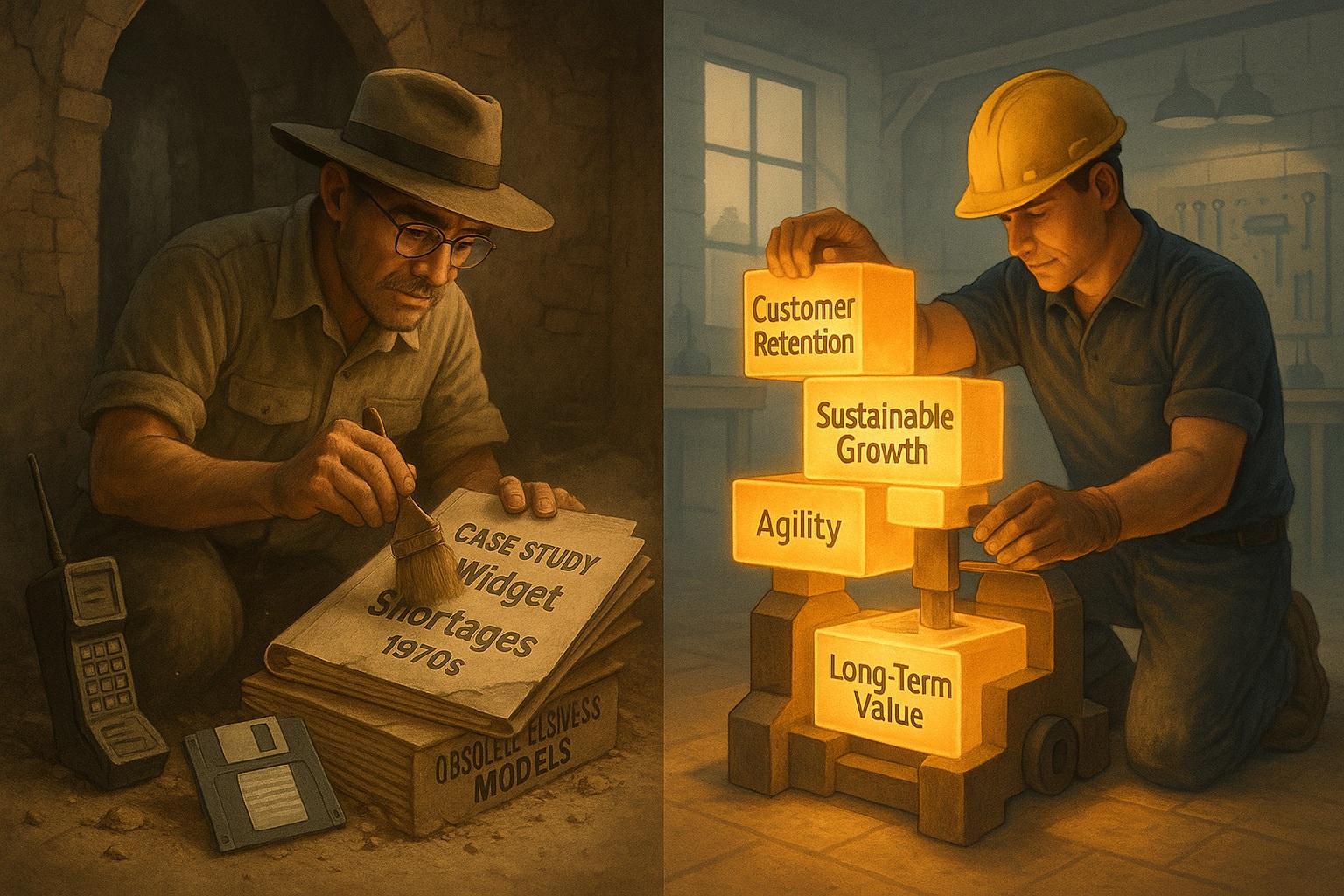Okay, let's talk about learning business. I've spent thousands of hours with my nose in business books over the years, many of them absolutely crammed with case studies. We'd chew them over, my colleagues and I, trying to glean some wisdom. And I’ll be straight with you: while I hold the pursuit of knowledge through such study in the highest regard, a lot of that time spent dissecting those cases left me with more questions than answers. Not about the specific businesses in the studies, mind you, but about how we were supposed to genuinely learn and apply those lessons.
It often felt like we were archaeologists dusting off
relics. "Here’s Company X in 1978, facing a widget shortage”, and we would
discuss it. Vigorously trying to distil the learning. But the real learning,
the stuff that sticks and helps you navigate the fog of a real, live business
decision, often seemed to get lost in the shuffle of trying to guess the
‘right’ answer the author had in mind, or the pre-ordained "key
takeaways." We’d dissect the particulars of a situation that was often
decades old, in a market that no longer existed, with technologies that were
quaint at best.
My frustration wasn't with the idea of studying past events, but with the frequent failure to extract durable, fundamental principles from them. It was like being taught a hundred specific chess openings without ever truly understanding the value of controlling the center or the power of a passed pawn. You could pattern-match if a situation looked exactly like an old case, but the real world rarely offers such neat parallels. It’s always messier, the variables are different, and the future is stubbornly unwritten.
I remember sitting in my office, thinking about my earlier, pre-university jobs – the ones where you got your hands dirty, quite literally in some instances. You learn quickly that just because a certain mix of mortar worked perfectly on a dry, sunny day for an internal wall doesn't mean it's the right mix for a damp, north-facing retaining wall in a freeze-thaw cycle. The principle is about adhesion, compressive strength, and water resistance. The application changes. If you only learned the "sunny day recipe," you'd be in for a world of trouble.
That’s where I started to feel the pull towards first-principles thinking. Instead of asking, "What case study does this new problem resemble?", the more powerful question became, "What are the fundamental truths at play here? What are the core drivers of value, cost, and risk in this specific situation, in this current environment?"
Take acquiring software companies, something we’ve done a bit of. If you relied solely on case studies from, say, the dot-com boom, you might draw some very… exciting, shall we say, conclusions about growth at all costs. But if you dig down to first principles: what makes a software business truly valuable over the long term? It’s things like sticky customer relationships, recurring revenue, a defensible niche, the ability to generate free cash flow, and a culture that can retain and motivate good people. These principles hold true whether the market is booming or busting, whether the hot new thing is client-server or SaaS or AI. The specific tactics will change, but the underlying physics of what makes a good VMS business endure.
A case study might show how one company successfully integrated a large acquisition by centralizing all its functions. Another might show the opposite. Which one is "right"? Well, neither, or both, depending on the context. But the principle might be about understanding where economies of scale genuinely exist, versus where the agility and customer-centricity of a decentralized unit create more value. At Constellation, we've leaned heavily towards the latter, not because of a case study, but because we've found, through experience and analysis of our own operations, that human-scale business units, led by autonomous managers close to their customers, tend to outperform. That's a principle we've tested and re-tested in the messy reality of our own "living laboratory."
Study, an MBA included, can give you a fantastic toolkit: frameworks for analysis, financial literacy, an understanding of market dynamics. I wouldn’t trade that foundational knowledge. But the real craft of business isn't learned by just admiring the tools or reading the instruction manuals of past projects. It’s learned by picking up those tools and trying to build something, by seeing what works and what doesn’t when the wood isn't perfectly straight, and the nails sometimes bend.
So, while cases can be interesting historical accounts, I’ve found the real, enduring learning comes from striving to understand those fundamental principles – the "why" behind the "what" – and then having the courage and humility to test, adapt, and refine them, day in and day out, in the unforgiving but ultimately most rewarding classroom of all: the real world. That’s a curriculum that never gets old.

